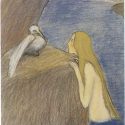Elisabeth Schøyen came from the well-to-do family of a public official; her father was a lord-in-waiting and administrative officer. Throughout her adult life, she tried to support herself by her writing. She attended Nissen’s girls’ school and wrote three books before the age of twenty-one. She later published a long series of novels and stories besides travel documents, articles on art history, and portraits of artists in Norwegian and foreign newspapers.
She made her debut anonymously in 1870 with the drama Johanna d’Arc, subsequently publishing a number of romantic stories and novels, Ragnvald, 1873, and Kamilla, 1873, under the pseudonym Paul Agathon, Svanhild, 1876, and Et Egteskab, 1878. While writing Svanhild, she asked Georg Brandes to be her paid literary consultant and adviser. Brandes declined, but the book was published and was also translated into French. In the 1880s she wrote novels and short stories, such as Kvindeskæbner. Tre noveller, 1886, that were more socially critical. She tried several times in vain to obtain a grant from the Norwegian Storting (Parliament).
In the early 1880s she spent a period in Paris, later in Italy, Germany, England, the USA, and Denmark. In the 1890s she turned her hand to writing novels with historical and religious themes, such as Hellig Olaf. Historisk Fortælling, 1897, and Messias. Jesu Kristi Liv etter de fire Evangelier, 1908. Many of her books, such as Grev Brahes hus, 1894, were published under the pseudonym Princess d’este Gonzaga, since she was adopted by the Duchess of Manua in London in 1893 and was entitled to call herself by this title. Some of her books had a large print run.
Over ten years, twenty-five thousand copies of Dronning Margrethe, 1901, were printed. Her semi-documentary story Den hvite slavinde. Det XX Aarhundredes Skændsel, 1905, was also highly successful and was translated into several languages. The edition of 1914 entitled Den hvide Slavehandel contained a preface written by the chair of the German “alliance of women’s associations”, by the chair of the Danish “committee for combating the white slave trade”, and by the German national committee for the international fight against trafficking in girls.


